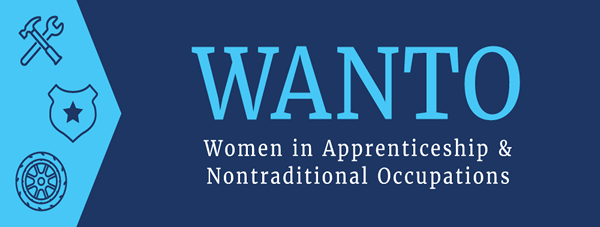Apprenticeships and nontraditional occupations are two often complementary pathways to good-paying jobs for women. Through apprenticeship programs, women can get paid work experience, classroom instruction and a portable, nationally-recognized credential. Apprenticeships are available in many fields and can prepare women for fulfilling careers, including in nontraditional occupations. Nontraditional occupations for women are defined as those in which women currently comprise 25% or less of workers. These tend to be higher-paid than occupations in which women comprise the majority of workers. Some examples include electricians, aircraft mechanics/technicians, and computer programmers.
The Women’s Bureau supports the recruitment and retention of women in apprenticeships and nontraditional occupations through several initiatives and resources.
Grants
Women in Apprenticeship and Nontraditional Occupations (WANTO) Grant
The Women in Apprenticeship and Nontraditional Occupations (WANTO) grant helps to expand pathways for women to enter and lead in all industries by recruiting, mentoring, training, and retaining more women in quality pre-apprenticeship and apprenticeship programs. Since 2017, the Women's Bureau has awarded nearly $31 million to 50 community-based organizations throughout the country that help women pursue apprenticeships and provide technical assistance to employers and labor unions to support women in apprenticeships and nontraditional occupations. Through quality apprenticeship and pre-apprenticeship programs, women have access to sustainable, successful, and high-paying careers in industries such as manufacturing, infrastructure, cybersecurity, and healthcare.
In 2025, the Women’s Bureau awarded $5 million to seven community-based organizations through the WANTO Grant Program in order to support women pursuing apprenticeships and nontraditional occupations.
Learn more about the WANTO Grant Program.
Videos
- Tamia Mack on Apprenticeship (May 2024)
- What can an apprenticeship do for you? (November 2023)

